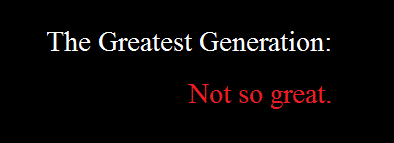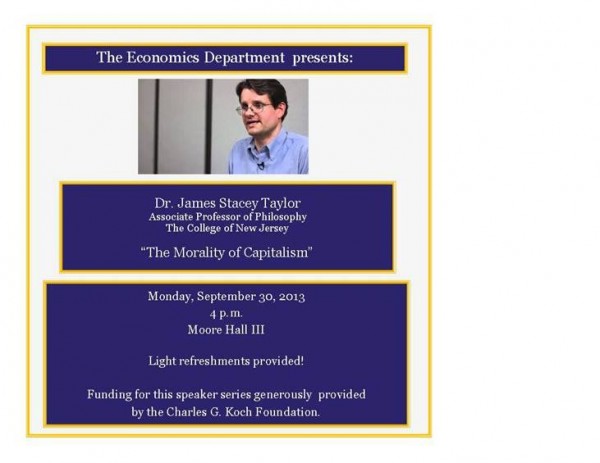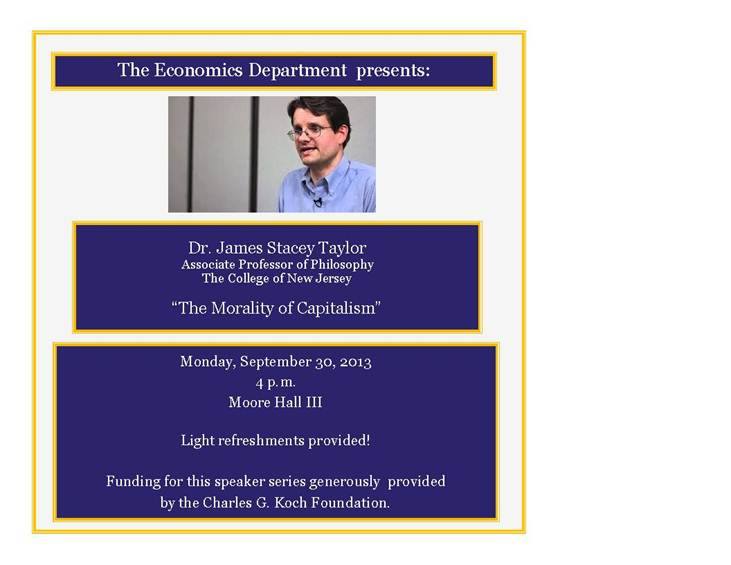 Moaning about the succeeding generation is a pretty common pastime in America, with a long and storied history. But just because something already’s been done doesn’t mean it won’t be done again. Enter “Why Generation Y Yuppies Are Unhappy“, a new entry into the “Next Generation Sucks” genre; but with stick figures! It’s obvious, says the author, that Millennials have false expectations and “think they’re special.” Pictures of unicorns and flowers abound, just to really rub in the mockery.
Moaning about the succeeding generation is a pretty common pastime in America, with a long and storied history. But just because something already’s been done doesn’t mean it won’t be done again. Enter “Why Generation Y Yuppies Are Unhappy“, a new entry into the “Next Generation Sucks” genre; but with stick figures! It’s obvious, says the author, that Millennials have false expectations and “think they’re special.” Pictures of unicorns and flowers abound, just to really rub in the mockery.
But while there’s plenty to pick apart and criticize (Mother Jones reporter Adam Weinstein has a critique well worth reading), I want to focus solely on the claims about the G.I. or “Greatest” Generation:
Lucy’s parents were born in the ’50s — they’re Baby Boomers. They were raised by Lucy’s grandparents, members of the G.I. Generation, or “the Greatest Generation,” who grew up during the Great Depression and fought in World War II, and were most definitely not GYPSYs.
Lucy is the author’s fictional Millennial, and GYPSYs is the delightfully offensive term the author has cooked up for Lucy and her cohorts (I have my own acronym for the writer and their peers: Whiny Authors in Need of a Kick).
The so-called “Greatest Generation” is the recipient of a lot of rose-tinted glassed stares of longing these days. Apparently people dream of the time when men were men, women were meek, black people were free to be openly oppressed, and Indians were undergoing cultural genocide. But while the obvious flaws with the 1940s are well known, the idea that the Greatest Generation struggled through the Great Depression and stepped up at our hour of need to topple fascism and then build this country into a world superpower is a cultural touchstone.
Let’s get rid of that touchstone, because it’s a complete crock. All of those required massive government intervention, directed and conceived by the two generations before them, the Missionary and the Lost Generations. Without the leaders in Congress and the White House who ushered in the New Deal, the G.I. Generation wouldn’t have had work during the Great Depression. Without the re-implementation of the draft, not only would the G.I.’s not had work, but there wouldn’t have been a labor shortage that required women to enter the labor force. And without a war fought abroad that devastated all of America’s competitors while leaving U.S. industry unscathed, the G.I. Generation wouldn’t have found it as easy to sell American products to the world (and let’s not forget that servicemen were offered cheap homes and education/training after the war).
It’s important to look at the draft aspect of this, since much of the myth of the “Greatest” Generation is tied to its service in World War II. The Selective Service System reports that during the course of the war, over 10 million men were inducted into the military. Gen. William Westmoreland placed this number at about two-thirds of the military of World War II. Of those 10 million+ inductees, . In a tour of duty, the average World War II soldier saw 40 days of combat in the whole war.
Compare this with their children (the Baby Boomers) who fought in the Vietnam War. 1.8 million were inducted. Westmoreland put the figure of drafted soldiers at one-third of the military of Vietnam. Of all of the potential draftees (not those actually inducted), 100,000 fled the country. Finally, thanks to the helicopter, the average tour of duty exposed a soldier to 240 days of combat; many soldiers did multiple tours.
Currently, the entire military is volunteer, and the average tour of duty in Iraq and Afghanistan saw 310 days of combat, often tours of duty were extended. In case you’re unclear about what a “day of combat” is, it’s a day on during which the continuation of life is uncertain.
But Millennials suffer from false expectations and think they’re special. This isn’t about soldiers, this is about our poor deluded, entitled children.
I bring up the military comparison to show just how different the way each generation is perceived. The G.I. Generation saw the least amount of combat, was strong-armed by the government to serve, and today are hailed as heroes. The Baby Boomers stepped up, were exposed quite often to completely new type of war, and today are remembered as an army of unwilling draftees. The Millennials and Generation Xers who fought in Iraq and Afghanistan are praised for their service or touted by wannabe patriots, but are largely ignored otherwise.
The reality is that the Millennials have suffered through the most debt-leveraged time in American history, and one of its greatest economic crises. It is the most unequal time on record. Where American leaders of the past dealt with such crises with large encompassing platforms, with radical changes to the shape and fabric of American society, the simple fact of the matter is that the generations currently in power refuse to do what the grandparents and great-grandparents did before them.
When I see these articles that lambast my generation, I recognize them for what they are: expressions of guilt. It’s no secret that the Millennials and our successors are inheriting a country that is adrift. The economy is unrecognizable from the one Boomers and the predecessors grew up with. They’re hesitant and unwilling to act, thanks to a venomous orthodoxy that tells them government is bad, business is good. The very future of the world is uncertain.
It’s clear to me that Millennials cannot rely on their predecessors for assistance. We’re going to have to solve this world’s problem on our own; unlike the preceding generations, we can expect only diminishing assistance. And hopefully, when the next crisis hits, there will be enough of us in power that we won’t make the mistakes our predecessors did.
 James Stacey Taylor is best known for writing the book “Stakes and Kidneys: Why markets in human organs are morally imperative” in which he argues that people ought to be able to sell their non-essential living organs if they see fit. He does not argue for an unregulated kidney market, as would the Koch brothers.
James Stacey Taylor is best known for writing the book “Stakes and Kidneys: Why markets in human organs are morally imperative” in which he argues that people ought to be able to sell their non-essential living organs if they see fit. He does not argue for an unregulated kidney market, as would the Koch brothers.

